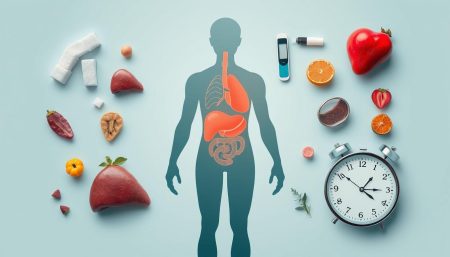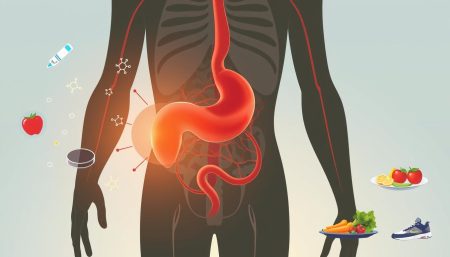Understanding how to avoid diabetes mellitus is key. A proactive approach is vital. With diabetes on the rise, it’s important to know diabetes prevention tips that fit into daily life. This guide offers effective and easy-to-follow strategies to reduce diabetes risk factors greatly.
Making small changes in diet and exercise can help a lot. Effective diabetes prevention strategies are about living healthier. It’s not about big changes but making smart choices every day. Remember, small steps today can lead to big benefits for life.
Understanding Diabetes Mellitus and Its Impact
Exploring what is diabetes mellitus reveals two main types. Type 1 is an autoimmune disease. Type 2 is linked to lifestyle and genetics. Knowing the difference is key to managing and avoiding Type 2 diabetes.
The impact of diabetes on health is wide-ranging. It can harm major organs and cause serious issues like heart disease and vision loss. So, it’s vital to understand how to prevent and manage it.
- Regular monitoring of blood glucose levels
- Adopting a balanced, nutritious diet
- Incorporating regular physical activity into daily routines
These actions help prevent diabetes and slow its progression after diagnosis.
Understanding diabetes is the first step in avoiding Type 2 diabetes and reducing its impact on health. Early detection and lifestyle changes are essential for those at risk or living with diabetes mellitus.
Embracing a Balanced and Nutritious Diet
To prevent diabetes, it’s key to eat a balanced diet. This diet helps keep your blood sugar in check. Here, we’ll talk about important food choices that can lower your diabetes risk.
Choosing Whole Grains Over Refined Carbohydrates
Choosing whole grains for health is vital. They manage blood sugar better than refined carbs. Whole grains have more fiber, which slows down sugar absorption and keeps blood sugar steady.
Incorporating Fiber-Rich Foods to Manage Blood Sugar
Eating foods high in dietary fiber and blood sugar management is key. Fiber-rich diets help control blood sugar and support digestion. They also help keep your weight healthy.
Limiting Sugary Beverages to Reduce Risk
One easy change is to limit sugary drinks. These drinks can lead to weight gain and increase diabetes risk. Try water, herbal teas, or unsweetened drinks instead.
| Food Type | Benefits | Examples |
|---|---|---|
| Whole Grains | Rich in fiber, supports steady blood sugar | Brown rice, quinoa, whole wheat |
| Fiber-Rich Foods | Enhances digestion, controls blood sugar spikes | Beans, berries, broccoli |
| Sugary Beverages | Limited intake reduces sugar spikes and weight gain | Soda, fruit juices, energy drinks |
Regular Physical Activity for Insulin Sensitivity
Regular physical activity is key for better insulin sensitivity and blood sugar control. This section looks at how different exercises can help improve metabolic health.
Finding Enjoyable Exercises to Stay Consistent
Sticking to a workout plan is easier when you enjoy the activities. Adding enjoyable workouts to your day can be anything from dancing to cycling. This makes exercise feel like a positive part of your life, not a burden.
Choosing activities you love helps keep you consistent. This is vital for lasting benefits in insulin sensitivity.
Building Muscle to Enhance Glucose Absorption
Muscle building is important for better glucose metabolism. It helps muscles absorb more glucose during and after exercise. Activities like weight lifting and using resistance bands can increase muscle mass.
This leads to better glucose absorption and insulin sensitivity. Adding muscle-strengthening exercises to your routine is essential.
Setting Achievable Fitness Goals
To boost your insulin sensitivity, setting achievable exercise goals is key. Begin with small, achievable targets, like a 30-minute walk five days a week. As you get fitter, increase the intensity and duration.
This approach helps make physical activity a part of your daily life. It avoids feeling overwhelmed and encourages long-term health improvement.
Monitoring and Managing Body Weight
Managing body weight is key to lowering obesity and diabetes risk. There’s a clear link between too much weight and a higher diabetes risk. Keeping a healthy weight helps control blood sugar and boosts overall health.
A balanced Body Mass Index (BMI) is important for managing blood sugar. This helps lower the risk of diabetes.
- Regular monitoring of BMI to assess risks associated with obesity.
- Setting realistic weight control targets based on medical advice.
- Incorporating a diet and lifestyle that promote a healthy weight range.
Weight management plans should be tailored to each person. They should consider health history and lifestyle. This approach helps manage weight and reduce diabetes risk.
| Weight Category | BMI Range | Diabetes Risk Level |
|---|---|---|
| Underweight | <18.5 | Low |
| Normal weight | 18.5-24.9 | Normal |
| Overweight | 25-29.9 | Increased |
| Obese | 30 and above | High |
How to Avoid Diabetes Mellitus with Lifestyle Adaptations
Keeping well and avoiding diabetes starts with lifestyle changes for diabetes prevention and healthy habits for preventing diabetes. You don’t need to change everything at once. Just make small, better choices every day.
- Eat more whole, nutrient-rich foods.
- Do regular exercise that’s both aerobic and strength training.
- Manage stress with mindfulness and meditation.
- Stop smoking to lower insulin resistance and diabetes risk.
Diet and exercise are very important. Eating well helps with blood sugar and other health issues, like hair loss.
| Adaptation | Recommendation | Benefit |
|---|---|---|
| Dietary Changes | Eat more fruits, veggies, lean proteins, and whole grains. | Keeps blood sugar stable, boosts metabolism |
| Physical Activity | Do 150 minutes of moderate exercise like walking or swimming weekly. | Improves insulin use, lowers obesity risk |
| Stress Management | Practice yoga or meditation regularly. | Lowers blood pressure, boosts mental health |
| Smoking Cessation | Get help or join groups to quit smoking. | Reduces heart disease and diabetes risk |
Adopting these changes does more than prevent diabetes. It leads to a more energetic and happy life. Being informed and proactive about your health is the best way to a future free from diabetes and its problems.
Maintaining Consistent Blood Sugar Levels
Keeping consistent blood sugar levels is key to preventing and managing diabetes. By planning meal timing and glucose control, you can greatly affect how your body reacts to food. It’s also important to know about the glycemic index and diabetes prevention. This knowledge helps you pick foods that don’t quickly raise your blood sugar.
The Role of Meal Timing in Glucose Control
Eating at regular times is important for keeping blood sugar stable all day. Eating at set times helps avoid big ups and downs in blood sugar. This is good for people at risk of diabetes. Eating when your body naturally releases insulin helps your body process glucose better.
Understanding Glycemic Index and Load
The glycemic index (GI) is a useful tool for managing your diet to keep consistent blood sugar levels. Foods with a low GI are digested slowly, leading to a gradual increase in blood sugar. Here’s how different foods can affect your blood sugar:
| Food Type | Glycemic Index | Examples |
|---|---|---|
| Low GI | 55 or less | Lentils, barley, yogurt |
| Medium GI | 56-69 | Brown rice, oats, sweet potato |
| High GI | 70 or more | White bread, popcorn, melon |
Choosing foods based on their GI and load helps with better meal timing and glucose control. This is a big part of diabetes prevention.
Hydration: The Unsung Hero in Diabetes Prevention
Drinking enough water is more than just quenching thirst. It’s key to keeping your blood sugar in check and your metabolism working right. Knowing the benefits of water and cutting down on sugary drinks is very important.
Choosing Water Over Caloric Options
Choosing water over sugary drinks is a big step in controlling calories. It’s a simple move that helps with hydration and blood sugar control.
How Hydration Affects Blood Sugar
Keeping well-hydrated helps keep blood sugar levels steady. Dehydration can make blood sugar levels go up. Drinking enough water helps avoid these spikes, leading to better health.
| Drink | Calorie Content | Impact on Hydration | Effect on Blood Sugar |
|---|---|---|---|
| Water | 0 Calories | High | Neutral |
| Soda | Approx. 150 Calories | Low | High (Negative) |
| Fruit Juice | Approx. 120 Calories | Medium | Moderate (Neutral to Negative) |
| Sports Drinks | Approx. 80 Calories | Medium | Moderate (Neutral to Negative) |
Tackling Stress to Lower Diabetes Risk
Managing stress well is key to lowering diabetes risk through stress management. Chronic stress raises cortisol levels, which can harm cortisol and blood sugar levels. This increases the chance of getting type 2 diabetes. By using stress reduction techniques, people can improve their health and lower diabetes risk.

Understanding how cortisol affects blood sugar is important. High cortisol levels can mess up how the body uses glucose, leading to high blood sugar. So, managing stress is not just about mental health. It’s also about physical health.
- Meditation and mindfulness help keep cortisol levels stable.
- Regular exercise can reduce stress and lower blood sugar.
- Getting enough sleep is key for managing stress and metabolic functions.
Let’s see how these stress reduction methods affect health:
| Technique | Impact on Cortisol | Impact on Blood Sugar |
|---|---|---|
| Meditation | Decreases cortisol levels | Stabilizes blood sugar |
| Exercise | Lowers cortisol spikes | Reduces blood sugar levels |
| Sleep | Regulates cortisol production | Maintains consistent blood sugar levels |
By using these stress reduction methods, people can manage their stress better. This helps protect against diabetes. It also improves life quality and supports long-term health.
Abstaining from Smoking and Limiting Alcohol Intake
Making lifestyle changes like quitting smoking and drinking less are key to avoiding diabetes. Knowing how these actions affect your health helps you make better choices for a healthier life.
The Direct Effects of Smoking on Diabetes Risk
Studies, like those in The Lancet Public Health, show a strong link between smoking and diabetes risk. Quitting smoking is good for your lungs and helps control blood sugar. It also lowers inflammation, which reduces the chance of getting diabetes.
Moderation of Alcohol as a Prevention Strategy
Drinking alcohol and diabetes are linked. Drinking in moderation might protect against heart disease, common in people with diabetes. But, drinking too much can lead to extra calories, liver problems, and unstable blood sugar. So, drinking in moderation is important for preventing diabetes.
Regular Health Check-Ups and Blood Sugar Monitoring
Keeping up with health screenings is key to managing and preventing diseases like prediabetes and diabetes. Regular checks help track health changes and catch problems early. This is important for managing and preventing complications.
The Importance of A1C Tests
A1C tests are vital for checking blood sugar levels over the past three months. They help diagnose type 2 diabetes and spot prediabetes. By monitoring with A1C tests, you can see if your diet, exercise, and meds are working.
Recognizing Prediabetes Early
Finding prediabetes early through screenings can stop type 2 diabetes from developing. Early detection leads to lifestyle changes that improve health long-term.
Regular health checks lead to early action and a proactive health approach. They empower people to make smart health choices and live better.
Lifestyle Changes for Diabetes Prevention in High-Risk Individuals
Understanding and implementing tailored lifestyle interventions is key for high-risk diabetes prevention. This part looks at the practical steps to lower diabetes risk in those at high risk.
Changing your lifestyle is vital for managing and preventing diabetes. For those at high risk, making specific diet, exercise, and behavior changes is not just advised. It’s essential for a long, healthy life.
- Start and keep a balanced diet full of whole foods, and cut down on processed sugars and fats.
- Do regular physical activity that fits your ability and likes, aiming for 150 minutes of moderate activity weekly.
- Check your blood glucose often to manage and prevent spikes.
Sticking to these tailored plans can really help high-risk groups. It can stabilize blood sugar and improve overall health.
| Lifestyle Change | Benefits |
|---|---|
| Dietary Adjustments | Improves metabolic functions and reduces sugar spikes |
| Increased Physical Activity | Enhances insulin sensitivity, reduces obesity |
| Blood Glucose Monitoring | Helps in early detection and management of possible complications |
These strategies are good for everyone, but they’re even more important for those at high risk of diabetes. Creating personalized plans that fit individual health needs and lifestyles makes the interventions more effective.
Medicinal Approaches and When to Consider Them
The path to medicinal prevention of diabetes includes many strategies. Pharmaceuticals are key for those at high risk. Knowing when and how to use these medicines is vital for better health.
Understanding the Role of Metformin in Prevention
Metformin is a top choice for metformin and diabetes prevention. Research, like from the Diabetes Prevention Program Research Group, shows it works well. It helps stop prediabetes from turning into diabetes, making it a key part of diabetes prevention.
Herbal Supplements and Natural Remedies
Herbal remedies for glucose control are also popular. They offer extra help for managing blood sugar. But, they should be used with a doctor’s advice.
Many herbal supplements, like cinnamon, fenugreek, and berberine, may help with early glucose issues. But, always talk to a healthcare provider before starting any new supplement.

| Supplement | Active Component | Potential Benefit |
|---|---|---|
| Cinnamon | Cinnamaldehyde | May decrease fasting blood glucose |
| Fenugreek | Diosgenin | Helps to improve glucose tolerance |
| Berberine | Berberine | Known to reduce the risk of diabetes progression |
Creating a Supportive Network and Educating Oneself
Keeping healthy and avoiding diabetes is a team effort. It’s not just about what we do alone. It’s also about the help and knowledge we get from others. By learning about diabetes prevention education and joining support networks for health, we can make better choices. These choices help lower our chance of getting diabetes.
Learning about diabetes is key. It helps us understand risks and how to manage them. It also lets us watch our health closely and change our diet and lifestyle. Plus, support networks for health give us the push and support we need. They help us keep up with our healthy habits for a long time.
- Workshops on diabetes prevention education share important info about the disease.
- Community health fairs let people come together to learn from experts.
- Online forums and social media groups are great for sharing tips and experiences.
Having emotional and practical support from friends and family is very important. This support helps us stay active, eat healthy, and go for regular check-ups. It keeps us motivated and on track.
| Activity | Benefits | Examples of Support |
|---|---|---|
| Educational Seminars | Improves knowledge on managing risks | Lectures, webinars |
| Regular Exercise | Enhances insulin sensitivity, manages weight | Gym memberships, fitness buddy systems |
| Nutritional Planning | Helps maintain balanced blood sugar levels | Nutritionist consultations, group cooking classes |
It’s vital to keep learning and seeking support. By being around the right people and resources, we can lower our diabetes risk. This way, we can live healthier lives.
Sleep Quality and Its Effect on Glucose Regulation
The link between sleep and diabetes prevention is now well understood by doctors. A study in Sleep Medicine Reviews shows how good sleep helps control hormones. This, in turn, affects how our body handles sugar.
Poor sleep can lead to insulin resistance, a sign of diabetes. Getting enough quality rest for glucose control helps manage blood sugar better.
The importance of sleep’s role in metabolic health is clear. Good sleep is key for a healthy metabolism. It’s when we sleep deeply that our body processes sugar best. Any sleep disruption can cause an imbalance.
So, getting a good night’s sleep is essential for keeping your metabolism healthy. This helps lower the risk of diabetes.
To improve sleep and better glucose control, follow these tips. Stick to a regular sleep schedule and have a calming bedtime routine. Make sure your bedroom is set up for sleep.
Stay away from caffeine before bed and relax with calming activities. These habits can greatly improve your health and lower diabetes risk.
FAQ
Q: What are practical tips for avoiding diabetes mellitus?
A: To avoid diabetes mellitus, start by being active every day. Keep a healthy weight and eat foods rich in fiber. Avoid smoking and drinking too much alcohol.
Manage stress well, drink plenty of water, and check your blood sugar often.
Q: What is the impact of diabetes mellitus on health?
A: Diabetes mellitus can cause serious health problems. These include heart disease, stroke, and kidney failure. It can also lead to vision loss and amputations.
Managing diabetes can help prevent these serious issues.
Q: Why should I choose whole grains over refined carbohydrates?
A: Whole grains have more fiber and nutrients than refined carbs. This helps control blood sugar and lowers the risk of type 2 diabetes.
Q: How can I make physical activity part of my routine to prevent diabetes?
A: Choose activities you enjoy and that fit your life. Building muscle helps with glucose absorption. Set goals to keep exercising regularly.
Q: Can managing body weight reduce the risk of diabetes?
A: Yes, losing weight through diet and exercise can lower your risk of type 2 diabetes. This is true for those who are overweight or obese.
Q: What lifestyle changes can help prevent diabetes?
A: To prevent diabetes, eat a balanced diet and exercise more. Manage stress, quit smoking, and drink alcohol in moderation.
Q: How does meal timing affect blood sugar control?
A: Eating at the same times every day helps keep blood sugar levels steady. This prevents spikes and dips that can lead to diabetes.
Q: Why is proper hydration important for diabetes prevention?
A: Drinking enough water helps control blood sugar levels. It also prevents overeating, which can lower the risk of type 2 diabetes.
Q: How does stress influence the risk of developing diabetes?
A: Chronic stress can raise cortisol levels. This hormone can increase blood sugar levels and raise the risk of diabetes.
Q: Why should I abstain from smoking and limit my alcohol intake to prevent diabetes?
A: Smoking and drinking too much alcohol can increase diabetes risk. Quitting smoking and drinking less can help prevent diabetes.
Q: How often should I have health check-ups for diabetes prevention?
A: Get regular check-ups, including A1C tests. These help monitor blood glucose levels and catch early signs of diabetes.
Q: Are there special considerations for high-risk individuals regarding diabetes prevention?
A: Yes, high-risk individuals may need more specific plans. This includes stricter diets, intense exercise, and closer medical monitoring to prevent diabetes.
Q: When should I consider medicinal approaches for diabetes prevention?
A: Medicines like metformin or supplements might be considered for those with prediabetes or at high risk. This is if lifestyle changes alone don’t work.
Q: How can a support network aid in diabetes prevention?
A: A support network offers motivation, accountability, and knowledge. These help keep up healthy habits needed to prevent diabetes.
Q: Why is sleep quality important for regulating blood glucose?
A: Good sleep helps balance hormones that affect hunger and insulin use. This aids in glucose regulation and lowers diabetes risk.


















